7 Major Reasons Why Your Credit Card Application Was Declined
Updated: 18 Sept 2025
Written bySingSaver Team
Team

The information on this page is for educational and informational purposes only and should not be considered financial or investment advice. While we review and compare financial products to help you find the best options, we do not provide personalised recommendations or investment advisory services. Always do your own research or consult a licensed financial professional before making any financial decisions.
Back in the old days, when credit cards were first introduced, it was rather difficult to obtain one.
Keeping a credit card in the wallet gave owners the feeling of high social status. Today, 73% of Singaporeans keep at least one credit card in their pocket. In fact, around 10% of Singaporeans own more than six credit cards.
Applying for your first (or next) credit card can be exciting — until you receive that dreaded rejection email. Don’t panic. Banks don’t always explain clearly why you were declined, but in most cases, it comes down to a few common reasons. Let’s break them down, and more importantly, what you can do about them.
✨Get the Reward Upgrade You Deserve✨
Get your dream Apple, Dyson, Sony, or Nintendo gadgets when you apply for select Citi, HSBC, OCBC, or Standard Chartered credit cards via SingSaver and top up as low as S$60! Valid till 1 March 2026. T&Cs apply.
1. No prior history of credit cards
If this was your first card application, the rejection may simply be because you don’t have any credit history yet. Even if you meet the minimum salary requirement, banks want to see proof that you can handle credit responsibly.
What you can do:
-
Start with an entry-level or no-fee credit card.
-
Use it responsibly for 3–12 months, always paying your bills in full and on time.
-
Apply with the bank where your salary is deposited, since they already have visibility of your income flows.
-
Avoid applying for multiple cards at once. Each application leaves a record (hard inquiry), and too many in a short span can lower your score further.
Building a track record takes time, but once you’ve shown good repayment behaviour, it becomes easier to get approved for premium cards.
2. Applying for several credit cards at once
A common mistake new applicants make is submitting multiple credit card applications to different banks at the same time. It’s tempting — one card offers great cashback on shopping, another lets you rack up miles for travel, so why not apply for both?
Here’s the catch: every time you apply, the bank pulls your credit report from the credit bureau. If they see several applications in a short period, it may signal that you’re overextending yourself financially. This can hurt your credit score and reduce your chances of approval.
What should you do?
Your credit score does recover over time, so be patient. Space out your applications — wait a few months before trying again, and avoid applying for both a loan and a new credit card within the same month.
3. Using your full credit limit
Getting a high credit limit doesn’t mean you should max it out every month. Even if you pay your bills on time, consistently hitting your limit can make banks worry that you’re spending beyond your means.
Think of it this way: if a friend already owes money to several people but asks you for another loan, you’d probably hesitate. Banks think the same way when they see you regularly using most of your credit limit.
The rule of thumb? Keep your spending to around 30–40% of your available credit. If you have more than one card, spread out your expenses instead of loading everything onto a single card. This not only protects your credit score but also shows lenders that you manage your credit responsibly.
What is the best thing to do?
-
Keep utilisation under 30% of your limit whenever possible.
-
Pay your bills on time, every time.
-
Rotate spending across multiple cards if you already have them.
These small habits go a long way in keeping your credit score healthy — and making sure you’re in a good position the next time you apply for a new card.
4. Not meeting the minimum salary requirement
In Singapore, the typical minimum annual salary needed to apply for a credit card is S$30,000. For foreigners, the threshold can be higher — often S$42,000.
But meeting the minimum isn’t a guarantee. Think of it as the entry ticket. Banks may still decline if other factors raise red flags, such as existing debt, a low credit score, or lack of repayment history.
5. Debt-to-income ratio
Even if you earn well above S$30,000, banks will still check how much of your income is already committed to debt. This is known as your debt-to-income ratio (DTI).
For example, if you earn S$4,000 a month but spend S$1,500 on loan repayments, your DTI is nearly 40%. A high DTI suggests you may struggle to handle additional repayments, making banks more cautious.
Rule of thumb: Aim to keep your DTI below 30%. Paying down existing loans before applying can improve your chances significantly.
6. Errors in your application
Sometimes the rejection is as simple as a typo. Incorrect NRIC number, mismatched address, or missing employment details can cause automatic denials. Banks need accurate information to verify your identity and assess your eligibility.
Always double-check your application before submitting. If you’re unsure, call the bank to confirm what’s required.
7. Not eligible because of young age
Apart from income, banks also look at your age when reviewing credit card applications. If you’re under the minimum legal age (21 in Singapore), your application will automatically be declined.
Is there anything you can do in this case?
Not much, except to wait until you meet the age requirement. In the meantime, focus on building good financial habits — keep your expenses under control, pay bills on time, and manage any existing accounts responsibly. By the time you’re eligible to apply, you’ll already have a strong foundation for approval.
What to do if your credit card application was denied
First, don’t reapply immediately. Every rejection can negatively affect your credit score. Instead:
-
Check your rejection letter: Banks in Singapore must send you an adverse action letter within 30 days. This explains why you were denied, and often includes your credit score.
-
Get your free credit bureau report: You’re entitled to one free report after every rejection. Review it carefully to see what areas you can improve.
-
Start with entry-level cards: If you’re new to credit, begin with a free or basic cashback card. Use it for daily expenses and pay in full each month.
-
Space out applications: Apply again only after at least a few months, once you’ve improved your credit profile.
-
Reduce existing debt: Pay down loans or high balances to improve your debt-to-income ratio.
-
Build a track record: Paying bills on time, maintaining a salary account with the bank, and keeping your credit utilisation low are simple steps that can go a long way.
Rejections aren’t the end of the road. Think of them as feedback to improve your financial profile. With patience and smart money management, your chances of approval will rise — and so will the quality of cards you qualify for.
Find your perfect credit card deal now
Discover the latest credit card offers, compare rewards, fees and perks all in one place.
Latest reads on credit cards
Stay informed with the latest updates on credit card rewards, interest rates, and application tips designed for cardholders in Singapore.
Are Credit Cards Good or Bad?
Credit cards can be powerful tools or costly mistakes — it all comes down to how you use them.
About the author
SingSaver Team
At SingSaver, we make personal finance accessible with easy to understand personal finance reads, tools and money hacks that simplify all of life’s financial decisions for you.
